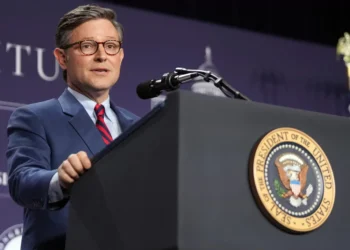It’s bittersweet, more sweet than bitter, bitter than sweet.
It’s a bittersweet … surrender.
I risk dating myself when I start quoting ‘90s rock, but Big Head Todd and the Monsters had it exactly right: For China, this is a bittersweet surrender to Donald Trump.
For a Communist Chinese regime that cares first and foremost about appearances, this was a very public waving of the white flag. There’s simply no other way to describe a tariff capitulation just weeks after its trade spokesperson vowed, “If the United States … persists in waging a tariff war, a trade war, or any other kind of war, the Chinese side will fight them to the bitter end.”
To. The. Bitter. End.
We saw signs of erosion in the Great Wall when it was announced last week that the ChiComs had agreed to meet a high-level U.S. delegation — led by Treasury Secretary Scott Bessent and U.S. Trade Representative Jamieson Greer — in Switzerland over the weekend for trade talks. Before that, we’d wondered whether The Tariff King was breaking China’s will. And sure enough.
After negotiating all weekend, Bessent announced the deal at 3 a.m. ET in a joint presser from Geneva. As the Washington Examiner reports, “The 90-day deal will reduce U.S. tariffs on Chinese imports from 145% to 30% and decrease China’s tariffs on American imports from 125% to 10%.”
Said Bessent in a fit of understatement, “We concluded that we have a shared interest. The consensus from both delegations is that neither side wanted a decoupling.”
Or, as Joe Biden might’ve whispered near a hot mic, “This is a big effing deal.”
According to a White House fact sheet:
China will remove the retaliatory tariffs it announced since April 4, 2025, and will also suspend or remove the non-tariff countermeasures taken against the United States since April 2, 2025. China will also suspend its initial 34% tariff on the United States it announced on April 4, 2025 for 90 days, but will retain a 10% tariff during the period of the pause.
The United States will remove the additional tariffs it imposed on China on April 8 and April 9, 2025, but will retain all duties imposed on China prior to April 2, 2025, including Section 301 tariffs, Section 232 tariffs, tariffs imposed in response to the fentanyl national emergency invoked pursuant to the International Emergency Economic Powers Act, and Most Favored Nation tariffs. The United States will suspend its 34% reciprocal tariff imposed on April 2, 2025 for 90 days, but retain a 10% tariff during the period of the pause.
The two countries added that trade talks would continue, and that seems entirely necessary, given that we were apparently unable to get China to agree to stop killing our people with fentanyl. As the Examiner adds, “America will keep its fentanyl-related levies on China.”
More than 107,000 Americans died from overdoses in 2023, primarily as a result of fentanyl, and much of that blood is on the hands of both China and the Mexican cartels — the former for its willful shipment of fentanyl’s component parts to Mexico, and the latter for its assembly and shipment of the deadly drug across our southern border. As Victor Davis Hanson put it recently, “The result over the last decade is more dead Americans from fentanyl than the total number of all U.S. soldiers lost in the wars of the twentieth century.”
The stock markets surged this morning upon news that the U.S. and China had reached a temporary trade agreement to lower the tariff temperature. At today’s opening bell, the S&P 500 shot up 2.65%, and Dow futures surged more than 1,000 points. The Nasdaq 100 was even more bullish, roaring upward 3.66%.
There’s been plenty of talk lately about how President Trump’s trade war has rattled the markets and kneecapped your retirement savings. Predictably, though, there’s been a lot less talk about how your 401(k) has, over the past few weeks, recovered all its losses since Trump’s “Liberation Day.”
Of course, Xi Jinping and his fellow commies will certainly try to spin their way out of this surrender, but let’s face it: It’s a head-snapping public policy shift to go from “bitter end” to “where do we sign?” in the blink of an eye.
And if history serves, the ChiComs will also cheat at every turn going forward. Here, though, we suspect the Trump administration will be a lot less likely than prior administrations to trust China.
“Trust but verify,” as a great anti-communist Cold Warrior once said.













